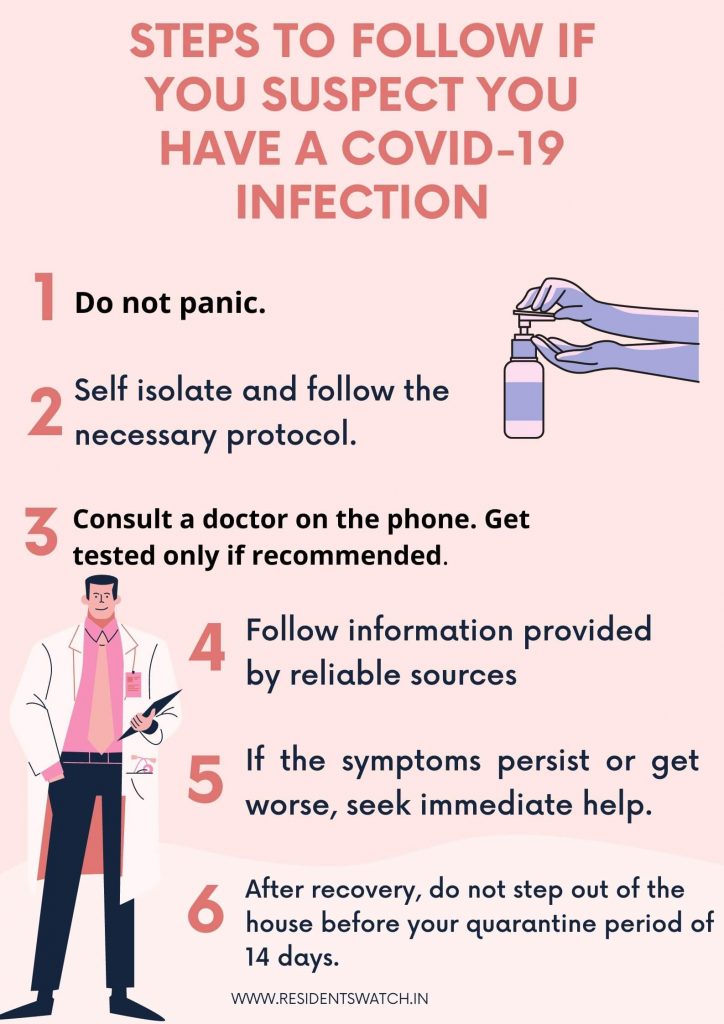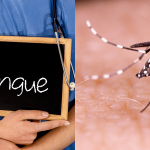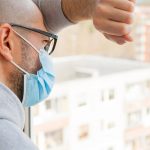
By Ritika Srivatsan
With over 26,000 active cases and 7000 active containment zones, Bengaluru has become a prominent COVID-19 hotspot. To curb the spike, the city went under lockdown for a second time from 15th July but inevitably, the number of cases will only increase after the ban is lifted. While there are various vaccine trials underway, there is currently no cure for COVID-19. So, what do you do in times of a COVID-19 scare? Who should you call and where should you go?
The Karnataka government and Bengaluru Bruhat Mahanagara Palike (BBMP) has issued certain guidelines which are to be followed in case an individual displays symptoms of the virus.
What are symptoms of the virus?
COVID-19 affects each person in a different way. According to the World Health Organisation (WHO), an individual usually displays symptoms within 5-6 days, but it can take up to 14 days.
Most common symptoms
- Fever.
- Dry cough.
- Fatigue.
Less common symptoms
- Sore throat.
- Aches and pains.
- Conjunctivitis.
- Headache.
- Loss of smell and taste.
- Diarrhea.
- Skin rashes.
- Discoloration of finger and toes.
Serious symptoms
- Difficulty with breathing.
- Chest pain.
- Loss of speech or movement.
Steps to follow if an individual displays symptoms
- Visit a fever clinic or consult a doctor.
Certain government and private hospitals identified in Bengaluru serve as fever clinics. They are the first point of contact that detect COVID positive patients.
- If the doctor does not recommend a COVID test, self-isolate and take the prescribed medicines until you feel better. If not, visit the fever clinic again.
- If the doctor suspects you have COVID-19 and recommends a test, visit COVID testing labs or swab collection centres.
- Self-isolate.
Strict self-isolation protocols must be followed until test results are received. If you live alone, ask someone to deliver groceries and essentials. If you stay in a shared space, try isolating yourself in a separate room with an attached bathroom to prevent contact with others.
- COVID – Negative
- Follow all necessary instructions and precautions.
- Consult a doctor if symptoms persist.
COVID – Positive
- Inform local health officials and immediately consult a doctor.
- If the symptoms are mild – you can choose to self-isolate at home with strict measures or isolate by registering at a COVID care centre.
- If the symptoms are severe:
- Call 108 (Disaster management services).
- Consult a designated COVID-19 hospital.
We called the numbers to ensure they were accurate. We removed three numbers as they were found incorrect. In other cases, BBMP had shared the personal numbers of doctors who didn’t know about it, and therefore, did not want their numbers to be shared.
The BBMP offers door-step testing for citizens who are co-morbid/senior/symptomatic primary contacts. Individuals can call the following helplines based on their zone:
- West – 080-68248454, 7204179723
- Bommanahalli – 8548883334, 8970002228
- Mahadevapura – 080-23010101/102
- Yelahanka – 080-28560696, 8792032820/5180
If you test COVID-19:
- Do not panic.
- Inform your loved ones but more importantly, the health officer.
List of health officers based on zones
- East zone – Dr Siddappa/9480684214
- South zone – Dr Shivakumar/9480973395
- West zone – Dr Hegde/9480683928
- RR Nagar – Dr Balasundar/9480685435
- Dasarahalli – Dr Balasundar/9480685435
- Bommanahalli – Dr Suresh/948063473
- Yelahanka – Dr Kumar/9480683674
- Mahadevapura – Dr Surendra /9801750539
- Choose the place of your treatment. Government hospitals are free but private hospitals are not. If you choose a private hospital, call them earlier to confirm the availability of beds.
- Inform the Residents Welfare Association (RWA) if you live in a residential complex.
- Pack essentials for 14 days (Phone, chargers, medical history and tablets, insurance papers and money).
- Stay away from any form of physical contact and avoid shared spaces.
- Make a list of primary contacts in the last 14 days.
- Be respectful to staff and health officials.
Before life returns to complete normalcy, we need to face COVID-19. That is only possible if we remain calm, mindful and deal with the situation as required.




